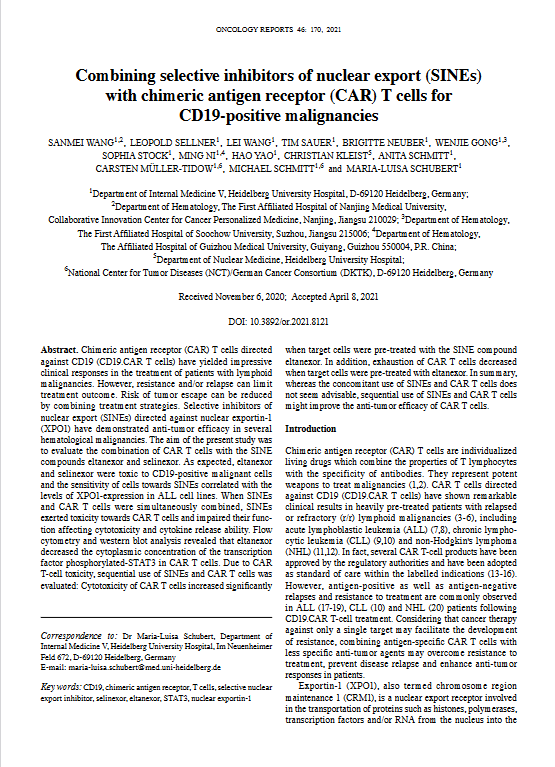06.05.2022
Combining selective inhibitors of nuclear export (SINEs) with chimeric antigen receptor (CAR) T cells for CD19‑positive malignancies.
Oncology Reports, 2021
Abstract
Chimeric antigen receptor (CAR) T cells directed against CD19 (CD19.CAR T cells) have yielded impressive clinical responses in the treatment of patients with lymphoid malignancies. However, resistance and/or relapse can limit treatment outcome. Risk of tumor escape can be reduced by combining treatment strategies. Selective inhibitors of nuclear export (SINEs) directed against nuclear exportin‑1 (XPO1) have demonstrated anti‑tumor efficacy in several hematological malignancies. The aim of the present study was to evaluate the combination of CAR T cells with the SINE compounds eltanexor and selinexor. As expected, eltanexor and selinexor were toxic to CD19‑positive malignant cells and the sensitivity of cells towards SINEs correlated with the levels of XPO1‑expression in ALL cell lines. When SINEs and CAR T cells were simultaneously combined, SINEs exerted toxicity towards CAR T cells and impaired their function affecting cytotoxicity and cytokine release ability. Flow cytometry and western blot analysis revealed that eltanexor decreased the cytoplasmic concentration of the transcription factor phosphorylated‑STAT3 in CAR T cells. Due to CAR T‑cell toxicity, sequential use of SINEs and CAR T cells was evaluated: Cytotoxicity of CAR T cells increased significantly when target cells were pre‑treated with the SINE compound eltanexor. In addition, exhaustion of CAR T cells decreased when target cells were pre‑treated with eltanexor. In summary, whereas the concomitant use of SINEs and CAR T cells does not seem advisable, sequential use of SINEs and CAR T cells might improve the anti‑tumor efficacy of CAR T cells.
R-Phycoerythrin-conjugated AffiniPure F(ab)2 Fragment Goat Anti-Human IgG (H+L) JIM-109-116-088 manufactured by our partner Jackson ImmunoResearch is featured in this study.
>> View article


